

Becoming Invisible In My Classroom. Becoming Invisible In My Classroom by Jane Healey, Increasingly Invisible Teacher.
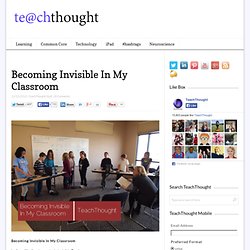
How to Get Kids to Work as a Team If the Adults Around Them Can't - Finding Common Ground. Learning stuff since 1964. White boards. Marking. All in a Tweet: Teaching great lessons? It’s down to us. My most RTed Tweet.
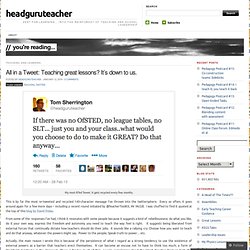
It gets recycled every few months. This is by far the most re-tweeted and recycled 140-character message I’ve thrown into the twittersphere. Every so often, it goes around again for a few more days – including a recent round initiated by @TeacherToolKit, Mr McGill. I was chuffed to find it quoted at the top of this blog by David Didau. From some of the responses I’ve had, I think it resonates with some people because it suggests a kind of rebelliousness: do what you like, do it your own way, express the freedom and autonomy you need to teach the way feel is right.
Actually, the main reason I wrote this is because of the persistence of what I regard as a strong tendency to use the existence of external powers as a barrier that teachers erect themselves. My tweet was a call to teachers to escape from the cage – which is already wide open – and to take ownership of everything they do in the classroom.
Forget About Learning Styles. Here’s Something Better. Tuesday, October 15, 2013.
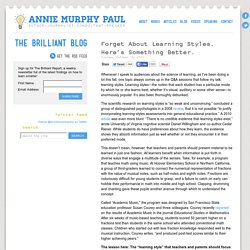
The Pitfalls of Learning Styles and How We Got Duped Into Believing in Them. Until about 10 years ago, I, like far too many educators, believed in learning styles, multiple intelligence theories and the like.
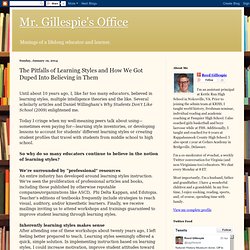
Mazur Criticizes Forms of Assessments. Current academic assessments fail to teach students skills that are applicable in the real world, argued Area Dean for Applied Physics Eric Mazur during a lecture to a packed hall in the Science Center Tuesday afternoon.
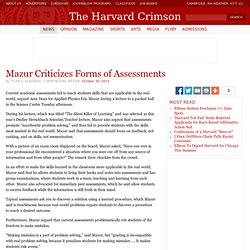
During his lecture, which was titled “The Silent Killer of Learning” and was selected as this year’s Dudley Herschbach Scientist/Teacher lecture, Mazur also argued that assessments promote “inauthentic problem solving,” and thus fail to provide students with the skills most needed in the real world. Mazur said that assessments should focus on feedback, not ranking, and on skills, not memorization. With a picture of an exam room displayed on the board, Mazur asked, “Have you ever in your professional life encountered a situation where you were cut off from any source of information and from other people?” BaBX8CRCUAIX6nK.jpg (JPEG Image, 450 × 698 pixels) - Scaled (94. Ever tried. Ever failed. No matter. Try Again. Fail again. Fail better. This post acts as an introduction to the webpage betterteaching.ie/failbetter.html and will also be the first link on that page.Why will this post help to make me be a better teacher in my classroom?
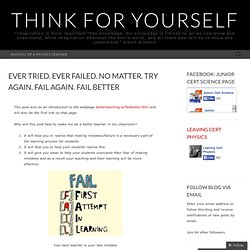
It will help you to realise that making mistakes/failure is a necessary part of the learning process for students.It will help you to help your students realise this.It will give you ideas to help your students overcome their fear of making mistakes and as a result your teaching and their learning will be more effective.
Your best teacher is your last mistake AnonFailure is a process…you have to fail over and over again to get anything worthwhile Jules FeifferEver tried. Ever failed. No matter. Try Again. Why we’ve got differentiation wrong. I hate the way that many of us teachers are encouraged to differentiate, and the way that many teachers understand the term.
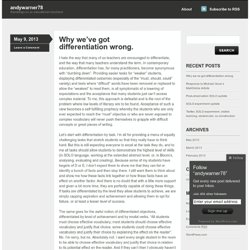
In contemporary education, differentiation has, for many practitioners, become synonymous with “dumbing down”. Providing easier tasks for “weaker” students, displaying differentiated outcomes (especially of the “must, should, could” variety) and texts where “difficult” words have been removed or replaced to allow the “weakest” to read them, is all symptomatic of a lowering of expectations and the acceptance that many students just can’t access complex material.
To me, this approach is defeatist and is the root of the problem where low levels of literacy are to be found. Sjunkins : What is Professional Development? Center on International Education Benchmarking. Effective CPD - Evidence Based Teachers Network (EBTN) Repeated research shows that the effect on your student's learning a few months later is too small to measure.
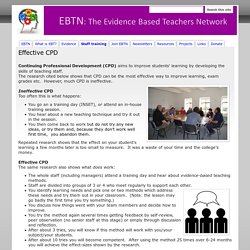
It was a waste of your time and the college's money. Effective CPD The same research also shows what does work: The whole staff (including managers) attend a training day and hear about evidence-based teaching methods.Staff are divided into groups of 3 or 4 who meet regularly to support each other.You identify learning needs and pick one or two methods which address these needs and try them out in your classroom. (Note: the lesson may go badly the first time you try something.)You discuss how things went with your team members and decide how to improve.You try the method again several times getting feedback by self-review, peer observation (no senior staff at this stage) or simply through discussion and reflection.After about 3 tries, you will know if this method will work with you/your subject/your students.After about 10 tries you will become competent.
Chi_molecule : Around #math table: Students... Collaborative learning. What is it?
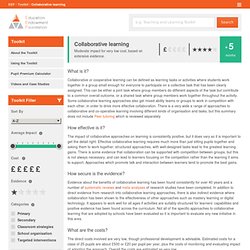
Collaborative or cooperative learning can be defined as learning tasks or activities where students work together in a group small enough for everyone to participate on a collective task that has been clearly assigned. This can be either a joint task where group members do different aspects of the task but contribute to a common overall outcome, or a shared task where group members work together throughout the activity.
Some collaborative learning approaches also get mixed ability teams or groups to work in competition with each other, in order to drive more effective collaboration. Home.